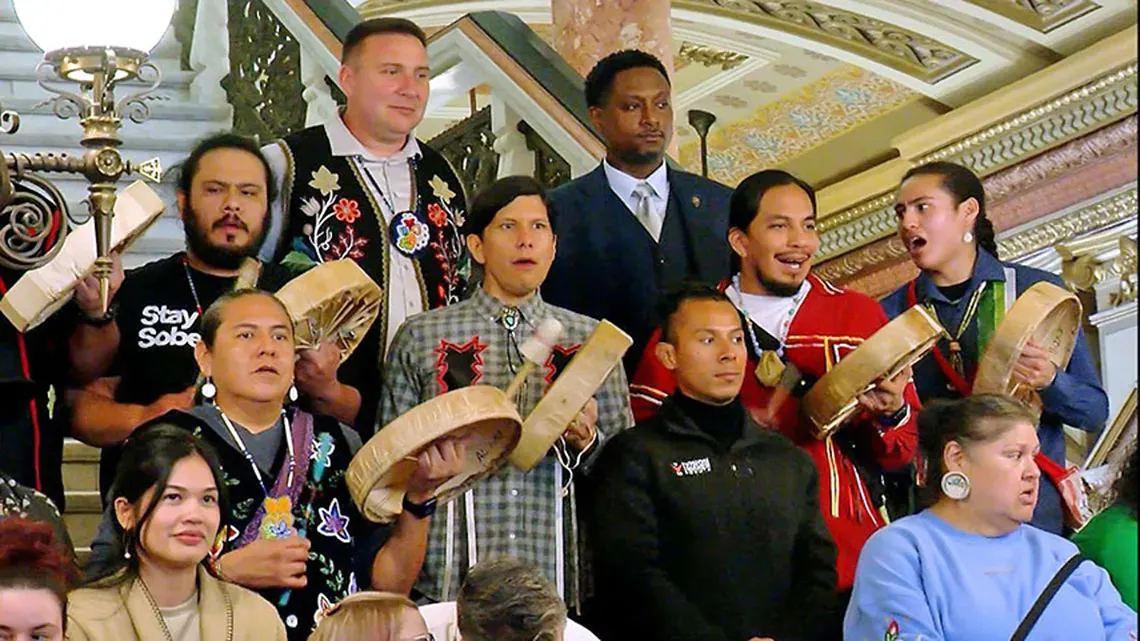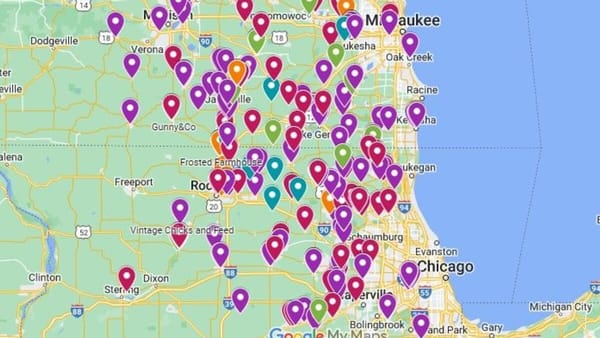State Senator Andrew Chesney opposes proposal to ban Native American mascots
HB1237 would have required Hononegah to remove the Indian logo when the Fieldhouse is replaced.

For five years, Rep. Maurice West, D-Rockford, has tried to pass a ban on school mascots that use Native American imagery, like the Cahokia Comanches or Mt. Zion Braves. That bill cleared the Illinois House 71-40 on April 10, 2025.
The mascot ban is now in the Senate, where it missed a deadline to get out of committee last week. While there are ways around that, it doesn’t bode well for the measure, which faces fierce opposition from some supporters of schools that have Native-themed mascots or team names.
If it passed the Illinois Senate, it would have required local schools to pick new logos and mascots by July 2026 to replace any that have Native American names and imagery by 2030. This would apply to Hononegah Community High School and South Beloit schools, including Blackhawk Elementary. The Hononegah Fieldhouse displays the school's traditional symbol of a Plains Indian with a feather headdress. The school's official athletic logo is a spear with a feather, but the bill specifically restricts those items.
The measure only applies to K-12 schools, not the University of Illinois, meaning that the state’s flagship university would still be allowed to use the “Fighting Illini” name for its sports teams, despite retiring its Native mascot almost 20 years ago.
The bill’s Senate sponsor was tight- lipped when our correspondents at Capitol News Illinois asked about the bill’s chances this year, citing the costs for schools to change mascots, uniforms and logos.
“I'm building a consensus and some support for the bill, and we'll see how it pans out,” Sen. Suzy Glowiak Hilton, D-Western Springs, said.
Andrew Johnson, a citizen of the Cherokee Nation and executive director of the Native American Chamber of Commerce of Illinois, is part of a working group convened by state Rep. Maurice West, D-Rockford, that’s at the forefront on Native American issues at the Capitol.
“I might not be a Native American, but I’m a Black man with my own history, and I am able to empathize with how they are feeling, so that’s what, that’s what keeps me going,” West said.
This year’s top priority for the working group would require K-12 schools to pick new logos and mascots by July 2026 to replace any that have Native American names and imagery by 2030. That measure passed the House 71-40 on April 10 and is awaiting action in the Senate in the session’s final three weeks.
The most recent bill to earn the governor’s signature returns stolen land to the Prairie Band Potawatomi Nation. Gov. JB Pritzker signed that measure nearly a year after the Prairie Band became the state’s first federally recognized tribe in April 2024.
Read more: Prairie Band Potawatomi becomes 1st federally recognized tribe in Illinois
Illinois has a well-documented history as a removal state, meaning Native Americans were forcibly removed multiple times, including through the Trail of Tears. The Prairie Band Potawatomi’s land in DeKalb County was erroneously declared “abandoned” by the U.S. government and sold at auction in 1849 because Chief Shab-eh-nay had temporarily left the land to visit relatives in Kansas.
Read more: Potawatomi to reclaim tribal land in DeKalb County
“We, the Prairie Band Potawatomi Nation, being the first tribe to have some of our unceded treaty lands reaffirmed here in the state, have tried to be very involved in issues here within the state,” said Raphael Wahwassuck, a council member for the Prairie Band Potawatomi Nation.
Wahwassuck is also a member of West’s working group and is pushing to secure passage of the mascot ban, among other policy changes.
“I hear counterarguments about how ‘oh we’re honoring’ or ‘this is our tradition,’ and I just don’t empathize with those because there’s better ways you can honor an individual or a group of people,” he said of the portrayal of Native Americans as school mascots.
The mascot ban before the Senate is not a new proposal – even for its House sponsor. West, the Rockford Democrat, first tried to pass legislation in 2020 that would ban Native mascots in K-12 schools, but he changed his plans upon a call from Andrew Johnson.
While Johnson relayed to West that mascots are an issue, he and other advocates wanted to prioritize something else: requiring schools to teach Native history.
That measure, sponsored by West, was signed into law in 2023, with the requirement taking effect this school year.
“The posture I have for my working groups is I’m the chauffer,” West said. “When I meet with them, they tell me what they want to do, and I simply share with them if there’s a path forward, and if there is a path, we start driving.”
Other native organizations supported the bill. However, the Ho Chunk tribe reportedly approves of Hononegah High School’s school name. The Prairie Band of the Potawatomi did not respond to ou request for comment.
- The bill read: ”a school board shall prohibit a school from using a native name, logo, or mascot; defines "native name, logo, or mascot". However, provides that a school may continue to use uniforms or other materials bearing a native name, logo, or mascot that were purchased on or before the effective date of the amendatory Act until September 1, 2030 if the school sets forth a reasonable timeline for the selection of a new school or athletic team name, logo, or mascot through formal school board action no later than July 1, 2026 (rather than if certain requirements are met). Includes a marquee, sign, or other permanent school structure that bears the prohibited native name, logo, or mascot that the school shall remove the next time the marquee, sign, or other permanent school structure is remodeled or replaced. Provides that if either a school or federally recognized tribe wishes to terminate consent to use a native name, logo, or mascot, the school shall select a new school or athletic team name, logo, or mascot through formal school board action no later than one year from the date of termination and shall discontinue use of the name, logo, or mascot no later than 3 years from the date of termination (rather than providing that if either a school or federally recognized tribe wishes to terminate an agreement, the school has one year from the date of termination to discontinue its use of the name, logo, or mascot). Makes other changes. Adds an effective date of July 1, 2026.Our
- State Senator Andrew Chesney (R-Freeport) says, "This is terrible legislation that would tear apart generations of community pride in school districts. The language of House Bill 1237 is confusing and inconsistent, which leads me to believe this is more about woke ideology and political theater than honest, well-intentioned policymaking. Several of my schools in the 45th District would be affected by this costly legislation, and school leaders can rest assured that I will do everything in my power to derail this bill in the Senate.”
- State Representative John Cabello says, “Schools will have to pay out of pocket to repaint logos, rebrand team materials, and replace signage. That’s money that could be going to classrooms and teachers, not some woke rebranding project.”





